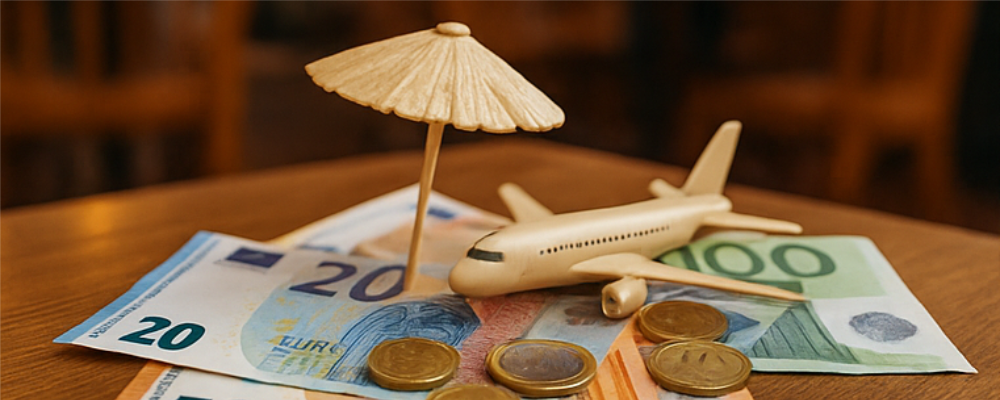
Holiday allowance in the hospitality industry
Holiday allowance, also known as holiday bonus or vacation pay, is an amount an employee receives that equals at least 8% of their gross salary. Every employee, including those in the hospitality sector (such as hotels), is generally entitled to this amount. Below, we explain who is entitled to holiday allowance, when it is paid out, how it is calculated, and what the legal rules and collective labor agreement (CLA) arrangements are. We also provide practical tips, for example, what to do if you do not receive your holiday allowance (on time). The information is kept accessible (B2 level), avoiding complex legal jargon.
Who is entitled to holiday allowance?
In principle, everyone employed under a contract is entitled to holiday allowance. This applies to permanent and temporary employees, full-time and part-time, as well as on-call workers with zero-hour or min-max contracts. Some important points:
All employees: According to Dutch law (Article 15 of the Minimum Wage and Minimum Holiday Allowance Act), every employee is entitled to at least 8% holiday allowance on the gross salary they have earned. This obligation applies regardless of contract type. You are also entitled to holiday allowance during periods of sick leave.
On-call workers: As an on-call worker with a zero-hour contract, you accrue vacation days and holiday allowance over the hours you have worked. Your holiday allowance is at least 8% of the wages you earned in the previous year. (More about payment for on-call contracts later in this article.)
Legal exceptions: There are two exceptions to the right to holiday allowance. (1) If the CLA states that no holiday allowance will be paid or that it will be paid at a lower rate, the base salary must be at least 108% of the minimum wage. (2) If an employee earns more than three times the minimum wage and this is agreed upon in writing, holiday allowance can be excluded or reduced. This applies to high salaries and rarely occurs in hotels.
Note: The legal term for holiday allowance is vakantiebijslag, and in some CLA texts, vakantietoeslag. In this article, we consistently use the term holiday allowance. Holiday allowance is separate from your regular salary and comes on top of it. It usually equals roughly one gross month’s salary or slightly less (because 8% of a year’s salary is 0.96 of a month’s salary).
When is holiday allowance paid?
Standard once a year: Employers must pay holiday allowance at least once per year. Most employees receive their holiday allowance annually in May or June. The hospitality CLA states that holiday allowance must be paid no later than June. Many hotels and other hospitality businesses choose to pay it in May, so employees can use it for summer vacations. However, paying in June is also allowed. Payment after June 30 is legally not permitted.
Payment when leaving the company:
If you leave the company or hotel before the annual payout month, you do not have to wait until May or June to receive your holiday allowance. At the end of your employment, all accrued holiday allowance must be paid out immediately, usually with your final salary. This applies even if you have not been employed for a full year. You will then receive holiday allowance for the period you worked.
Example: Suppose you have a contract from September to August (common for seasonal workers or traineeships in hotels). You receive holiday allowance in June for the period September–May. When your contract ends in August, you are then paid for the remaining period (June–August).
How is holiday allowance calculated?
Amount: Holiday allowance is usually 8% of the gross salary you earned in a year. The calculation period usually runs from June 1 to May 31 of the following year (the “holiday year” in hospitality). Some employers use the calendar year instead, but either way, it is 12 months of salary with 8% applied.
Including wage components: The holiday allowance is calculated based on your earned gross salary during the reference period. All hours worked count. Overtime counts in full, including any overtime bonuses. Holiday allowance must also be paid on overtime. For example, if you regularly work extra hours in a hotel (for instance, during busy events), you will also receive 8% on those extra earnings.
Exclusions: Certain one-time payments or special rewards are not included in the calculation. Incidental allowances, bonuses, and benefits in kind are generally excluded from holiday allowance. For example, profit sharing or a 13th-month bonus is typically not part of the base used to calculate holiday allowance.
Sick leave or unpaid leave: If you have been partially on sick leave or had unpaid leave, you accrue holiday allowance based on the salary you actually received. During sick leave, the accrual of holiday allowance continues, but over the (often slightly lower) salary paid during illness.
Example calculation: If you earn €2,000 gross per month as a full-time hotel employee, your gross annual salary will be €24,000. Your holiday allowance for this is 8% of €24,000 = €1,920 gross. If you earn less or more, you apply the same principle (8% of your annual salary). In practice, this often turns out to be slightly less than a full month’s salary, as noted earlier.
Summary: Holiday allowance in hospitality is 8% of your gross salary. You usually accrue a small amount each month, which is tracked separately. Your payslip generally shows how much you have accrued and/or been paid.
Holiday allowance according to law and CLA
The Minimum Wage and Minimum Holiday Allowance Act (WML) stipulates that employees must receive at least 8% holiday allowance, which must be paid at least once a year. In the hospitality CLA, the same rules apply, with a few additions:
Payment: Holiday allowance must be paid no later than June. Monthly payment is allowed, provided this is agreed upon in writing and clearly stated on the payslip.
Holiday year: Most hospitality companies calculate from June to May, but sometimes the calendar year is used. For the employee, this makes little difference: 8% holiday allowance is accrued on every euro earned.
Check your contract: Always check your employment contract or employee handbook for the exact agreements, such as the payout date.
Holiday allowance for on-call workers (zero-hour contracts)
On-call workers in hotels, such as banquet staff or extra cleaning and kitchen assistants, are entitled to holiday allowance just like other employees. There are, however, a few points to note:

Accrual per hour worked
Because you do not have a fixed number of hours or a fixed salary, holiday allowance is accrued on the salary per hour worked. Your payslip often shows a percentage indicating this reservation (8% holiday allowance).Monthly payment (“all-in”)
In the hospitality industry, holiday allowance is often included directly in your hourly wage (all-in wage). Your hourly wage is then higher, but you do not receive a separate payout later in May or June. Your payslip must clearly state which part is holiday allowance and which part is for vacation days. According to the CLA, this is 8.85% of the hourly wage for holiday allowance and 10.64% of the hourly wage for vacation days.Taking vacation
On-call workers are also entitled to paid vacation days. If your wage is all-in, you will not receive extra payment when taking vacation, as this has already been included. You must keep track of your vacation balance yourself and arrange leave in consultation with your employer. If you prefer to receive your holiday allowance once a year, discuss this with your employer or payroll company.
Tip: If you work through a payroll or employment agency, the same rules apply. Ask how and when they pay out your holiday allowance (per period or annually).
Holiday allowance for interns in hotels
Interns have a special status. In hotels, interns are often students from a hospitality program (MBO/HBO) who are gaining practical experience. It is important to know that an intern (BOL program) is not legally considered an employee. This means the usual employment rights, including holiday allowance, do not automatically apply. A few points specifically for interns:
BOL interns (Beroeps Opleidende Leerweg): These full-time students doing an internship are not legally entitled to wages or holiday allowance according to the law and the hospitality CLA. Instead, they receive an internship allowance. All agreements, such as allowance amount, number of days off, etc., are set out in an internship agreement, not an employment contract. No separate holiday allowance is accrued or paid on top of the internship allowance. BOL interns do not receive statutory vacation days. Often, there is an agreement that they can occasionally take time off, for example, for school or a short vacation. This must be included in the internship agreement.
Internship allowance in the hospitality industry: The hospitality CLA sets a minimum internship allowance to support interns. As of January 1, 2025, this is €400 gross per month for a full-time internship (4-5 days per week). This allowance is a fixed amount and essentially replaces wages; there is no additional 8% on top.
BBL interns (Beroeps Begeleidende Leerweg): A BBL intern (someone who works four days and goes to school one day) does have an employment contract and is considered an employee. BBL interns fall under the CLA and are entitled to minimum wage and all normal employment conditions. This means a BBL intern accrues holiday allowance (8% on the salary) and receives this payout like other employees. In practice, BBL interns often earn the minimum wage appropriate for their age and position, plus 8% holiday allowance.
It is good to note this difference: BOL intern = no wages and no holiday allowance, BBL intern = wages and holiday allowance.
Summary for interns: If you are doing an internship at a hotel through your program, you generally only receive an internship allowance and no holiday allowance. Discuss with the hotel how time off is arranged during your internship. Usually, you must request vacation from your internship company, and they will try to accommodate your wishes, but they may set reasonable limits. Anything different, such as an extra reward if you stay on after your internship, requires a separate employment contract. Make sure you know what you are and are not entitled to as an intern so that you do not have incorrect expectations.
Practical tips for employees
Finally, some practical tips and points to note regarding holiday allowance in the hospitality industry:
Check your payslips: Regularly check your payslip to see if your holiday allowance is being accrued. You will usually see a line with “accrued holiday allowance” or a percentage. For on-call workers, it may already be paid out monthly. This must be clearly indicated. This way, you will know whether you will receive something extra in May or June or whether you have already received it gradually.
Know when your employer pays it out: Ask when you start or check with your HR or manager when the holiday allowance will be paid. In most hotels, this is in May or June. It may also be stated in your employment contract. Set a reminder in your calendar if necessary.
If you do not receive your holiday allowance: If by the end of June you have not received your holiday allowance and you are entitled to it, take action. Start by talking to your employer or the payroll department. It could be a mistake or a misunderstanding about whether it has already been paid. If payment is still not made or you do not get a clear answer, send a written request (by email or letter) for payment of your holiday allowance. You are legally entitled to this, so you may certainly claim it. If necessary, involve a union or legal advisor for help; not paying holiday allowance is against the law. In extreme cases, you can legally claim the amount, possibly with statutory interest if it is paid late.
Getting advice if there are problems: If you notice irregularities (e.g., too little holiday allowance calculated or uncertainty about your all-in wage), you can contact various organizations. Unions (such as FNV Horeca, CNV, De Horecabond) offer support to members for these types of questions. You can also anonymously seek information from the legal help desk or the Dutch Labor Inspectorate if you suspect your employer is not complying with the rules.
Tax on holiday allowance: Be aware that more income tax is withheld from holiday allowance than from your regular wages. Holiday allowance is treated as a one-time extra income, which may place it in a higher tax bracket. Do not be alarmed if the net amount is lower than you expected from that 8% gross; this is due to tax calculations. You do not need to do anything yourself, as it is automatically processed through payroll tax.
With this information, you, as a hotel employee, are well-prepared for your holiday allowance. You now know who is entitled to it (almost everyone employed), how the amount is calculated, when you can expect it, and what you can do if something goes wrong. Holiday allowance is a valuable employment benefit that helps you truly enjoy your vacation or achieve other financial goals. If you have questions, make sure you get what you are entitled to and raise concerns with your employer or a professional in time. Enjoy your holiday in advance!
Sources: The above information is based on Dutch legislation (WML, BW) and the hospitality CLA, with explanations from reliable sources such as the Dutch government, union information from De Horecabond/CNV, and specialized articles. These sources are linked in the text for further details and reference.

This article has been reviewed by:
Sander (A.J.C.) Theunissen
Employment Lawyer (Counsel) - CLINT | Littler
Sander (A.J.C.) Theunissen has over fifteen years of experience and specializes in labor law and works council law. He has gained experience in labor law for the hospitality industry, among other areas.
Frequently asked questions about holiday allowance in hospitality
What is holiday allowance?
Holiday allowance is an extra payment on top of your salary, at least 8% of your gross wages.
In hospitality, it is usually paid in May or June.Who is entitled to holiday allowance?
Every employee in a paid role (permanent, temporary, part-time, on-call, BBL) accrues holiday allowance.
Exceptions: salaries over three times the minimum wage with written exclusion (rare) or contracts where holiday allowance is included in the wages (minimum 108% of the minimum wage).Am I entitled to holiday allowance when sick?
Yes, you accrue holiday allowance on the wages paid during your sick leave.When is holiday allowance paid?
By June 30 (per CLA)
Often in May
At termination, with your final salary
How is holiday allowance calculated?
8% of gross wages over 12 months (usually June to May)
Includes: overtime (including bonuses), paid sick leave
Excludes: one-time bonuses and gratifications
Example: €2,000 gross/month = €24,000/year ⇒ 8% = €1,920 gross.
How does holiday allowance work for on-call workers?
You accrue 8% per hour worked. With an all-in wage, it is included in your hourly rate.Example: 8.85% for holiday allowance + 10.64% for vacation hours.